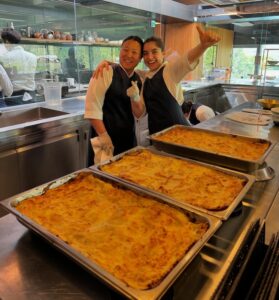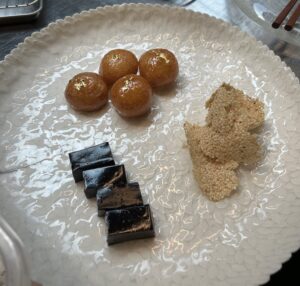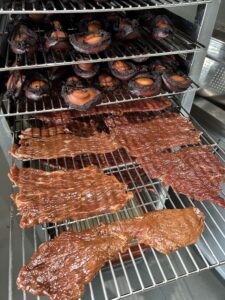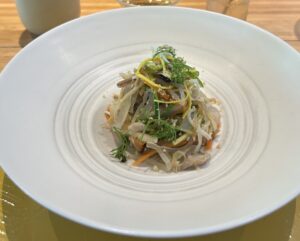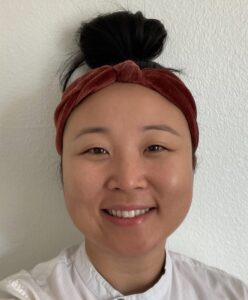
I decided to do my two month grant at Onjium, a Korean fine dining restaurant in Seoul, because I had a deep curiosity to learn more about my Korean heritage through food. I’ve grown up Korean American and although I am familiar with Korean cuisine through my family’s cooking, I wanted to learn more about its history and techniques. After much research into the best Korean restaurants in South Korea, Onjium seemed like the perfect fit. One of the traits I admired about Onjium was how unapologetically Korean it felt, even before I walked into their kitchen. Its menu was centered around Korean Royal Court Cuisine, the essence of Korean food culture that dates back to the 14th century. As I am progressing in my culinary career, I feel a special connection to Korean food and want to continue nurturing the cuisine that has helped me build my identity.
During my time at Onjium, I was fortunate enough to rotate through multiple stations in the kitchen. I entered my stage as a commis position, helping cooks prep for service. Monday was the start of the week for all of us and that was our main delivery and prep day, as we were closed for service on Mondays. We would break down all sorts of seafood. Cleaning and steaming hundreds of abalone, fileting local croaker and flounder for the sashimi course, and sometimes even marinating excess fish with ginger juice and turning it into dried jerky. I started my stage in late March, which was peak season for a variety of spring vegetables that I’ve never worked with. A typical prep day involved trimming and cleaning hotel pans full of namul, which are mountain greens typically blanched and lightly seasoned with sesame oil and salt.
Although there were dedicated cooks responsible for each station, we all worked as a collective, making sure produce was getting processed in the correct manner. For example, a group of 5 was easily able to tackle cleaning, slicing, and steaming a mountain of fresh bamboo shoots, since it was such a laborious task to do alone. We would finish our prep days by all cleaning the kitchen together, then gather in a meeting with the chefs to discuss any menu changes and things we can generally improve on before calling it a day.
Tuesdays through Friday consisted of lunch and dinner service. I would come in at 9am and get straight to helping cooks prepare for service. Every week was a different adventure. One week I would help with the rice and soup course, which consisted of precise knife work and sauteing and seasoning namul. Another week, I would assist with the cold noodle or naengchae course, where I would finely julienne carrots and squash, slice marinate shiitake mushrooms, blanch/season mung bean jelly, and gently cook cuttlefish.
Before lunch service started, we would all make sure to set some time to enjoy family meal together, a task that everyone took turns in making. Then all team members would have a quick meeting to discuss the guests that were coming in that day, talk about any menu changes, and make sure we go into service with the right mindset.
It was inspiring to be around a team that was collectively striving for excellence. Everyone was professional in their work and it really carried through working in a crowded kitchen. Everyone had a sense of urgency whether it was during service or not. Because cooks did not have the same specific duties each day, everyone had a general understanding of the whole menu, with its techniques and balance of flavors in each dish. Service was a matter of timing, which the team was excellent in managing as a whole. There was no traditional expo, where they would call out the table fires and tickets. Every cook and member of the service staff observed the dining room and communicated with each other to fire the courses when necessary. Working at Onjium opened my eyes to how important that mutual respect and trust is when working as a team.
Not only has my time at Onjium introduced me to a world of Korean cuisine I’ve never imagined, but working with such a hard-working and respectful team has struck a chord in me that I’ll carry throughout my culinary career. The vast range of local Korean produce and ingredients were such a pleasure to work with. Every day that I worked in Korea, I was inspired to think about how I could bring what I learned back to the U.S. – comparing and contrasting ingredients that were widely available in Korea and America, and trying to find the bridge that would translate into a delicious bite on a plate. This was my first experience working at a Korean restaurant, and the stage exceeded my experience of what I can achieve and learn. I’ve made incredible connections with the team members there and I’ve come back to LA with inspiration and motivation to keep nurturing my creativity in the kitchen. This opportunity has been an amazing step towards my journey, both culinary and personal, and I’m so grateful for the Ment’or Grant opportunity.
